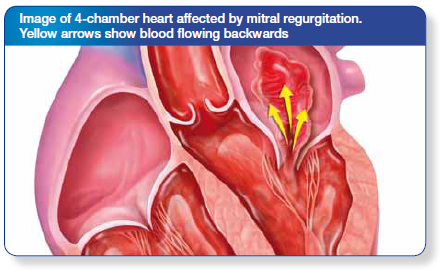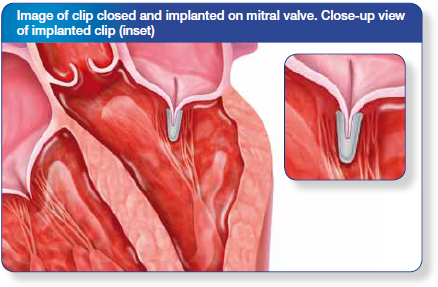The mitral valve clip device is attached directly to your mitral valve, without opening your chest. To access the mitral valve, a thin and flexible long tube called a catheter is guided through a vein in your leg to reach your heart. Using the catheter, the device is then clipped to the mitral valve, which allows it to close better. The procedure is performed under general anaesthesia, and you will be hospitalised for a few days after the procedure.

You should avoid demanding activity for at least 30 days afterward. It is also very important to carefully follow your doctor’s instructions regarding any medicines you need to take. Your doctor may also prescribe a blood thinner after you have received the treatment.
Most patients who undergo the mitral valve clip treatment do not need special assistance at home after the procedure, outside of ongoing needs for any unrelated health conditions.
About Mitral Regurgitation
Mitral Regurgitation – or “MR” – is a condition affecting one of the valves in your heart, the mitral valve. The valves in your heart control the flow of blood through the four chambers of your heart. Each heart valve is made up of thin, but strong flaps of tissue. As blood flows through the four chambers of the heart the valves open and close to ensure that blood flows in the right direction.
The mitral valve is located between your heart’s two left chambers, and allows blood to flow forward through your heart during a normal heartbeat. When the mitral valve fails to close completely, blood flows backward in the opposite direction. This backward flow is called mitral regurgitation.

Signs and Symptoms of Mitral Regurgitation
The signs and symptoms of mitral regurgitation depend on how advanced
it is and how quickly it has developed. Sometimes, there are few or no
symptoms, but when present they may include:
- Shortness of breath, especially after exertion or when lying down
- Fatigue and exhaustion, especially during increased activity
- Cough
- Sensations of a rapid, fluttering heartbeat
- Excessive urination at night
Causes of Mitral Regurgitation
There are several causes of mitral regurgitation. These include:
- Deterioration of valve tissue
- Congenital valve abnormalities (abnormalities present at birth)
- Heart disease, such as heart attack or other causes of weakening of the heart muscle
The Consequences of Mitral Regurgitation
MR places extra burden on the heart and lungs. Over time, some people may develop an enlarged heart because it has to work harder to pump blood through the body. If it is not treated, MR can cause other, more serious problems to your heart, such as heart failure, and may also result in irregular heartbeats or stroke.
Treatment of Mitral Regurgitation
Treatment of mitral regurgitation depends on how advanced the condition is, whether it’s getting worse and the symptoms that it causes. For mild cases, no treatment may be necessary but you will need to be monitored regularly by your doctor. Surgery and less-invasive mitral valve repair techniques are often used in more serious cases.
- Medications
When needed, your doctor may prescribe medicines that can help to make your symptoms more manageable. While these medicines manage your symptoms caused by mitral regurgitation, they do not treat the defect in the mitral valve itself. - Surgery
In certain cases, your doctor may recommend surgical treatment to repair or replace the valve. Mitral valve repair is often performed when the defect can be corrected by preserving your own valve. Mitral valve replacement is performed when repair isn’t possible. Both valve repair and valve replacement require open-heart surgery. - Less-invasive valve repair
In some cases, your doctor may recommend a less-invasive treatment, such as mitral valve clip therapy, that does not involve open-heart surgery.
About Mitral Valve Clip Treatment for Mitral Regurgitation
If you meet certain criteria, your doctor may recommend you for mitral valve clip treatment, which is a less-invasive method compared to openheart surgery. Cardiologists and cardiac surgeons who use this treatment are able to repair your mitral valve by attaching a “clip” to your valve. The device allows the valves to close more completely, and therefore helps to restore normal blood flow through your heart.

Glossary
Blood Thinner: A drug that helps prevent blood from clotting
Catheter: A tube used for gaining access to the inside of the body. In mitral valve clip therapy, a catheter is inserted at the groin to access the mitral valve of the heart
Congenital Valve Abnormality: An abnormality that is present in a heart valve at birth. It may be related to valve size, shape, or an irregularity in the way the valve is attached to the heart
Mitral Regurgitation: A disorder of the heart in which the mitral valve does not close properly w hen the heart pumps blood, and blood flows backwards in the opposite direction
Mitral Valve: A valve in the heart that lies between the left atrium and the left ventricle. The valve allows oxygen-rich blood to flow into the left ventricle, and then closes to prevent blood flowing back
Stroke: The rapid loss of brain function(s) due to irregularities in the blood supply to the brain. This can be due to lack of blood flow, caused by blockage, or haemorrhage (bleeding)



